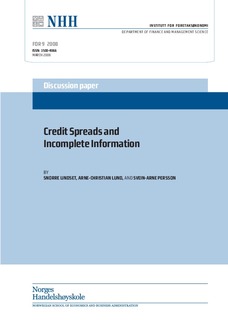| dc.contributor.author | Lindset, Snorre | |
| dc.contributor.author | Lund, Arne-Christian | |
| dc.contributor.author | Persson, Svein-Arne | |
| dc.date.accessioned | 2008-06-24T12:31:02Z | |
| dc.date.available | 2008-06-24T12:31:02Z | |
| dc.date.issued | 2008-03 | |
| dc.identifier.issn | 1500-4066 | |
| dc.identifier.uri | http://hdl.handle.net/11250/163933 | |
| dc.description.abstract | A new model is presented which produces credit spreads that do not converge to zero for short maturities. Our set-up includes incomplete, i.e., delayed and asymmetric information. When the financial market observes the company's earnings with a delay, the effect on both default policy and credit spreads is negligible, compared to the Leland (1994) model. When information is asymmetrically distributed between the management of the company and the financial market, short credit spreads do not converge to zero. This is result is similar to the Duffie and Lando (2001) model, although our simpler model improves some limitations in their set-up. Short interest rates from our model are used to illustrate effects similar to the dry-up in the interbank market experienced after the summer of 2007. | en |
| dc.language.iso | eng | en |
| dc.publisher | Norwegian School of Economics and Business Administration. Department of Finance and Management Science | en |
| dc.relation.ispartofseries | Discussion paper | en |
| dc.relation.ispartofseries | 2008:9 | en |
| dc.subject | credit risk | en |
| dc.subject | credit spreads | en |
| dc.subject | delayed information | en |
| dc.subject | asymmetric information | en |
| dc.title | Credit spreads and incomplete information | en |
| dc.type | Working paper | en |
| dc.subject.nsi | VDP::Samfunnsvitenskap: 200::Økonomi: 210::Bedriftsøkonomi: 213 | en |
